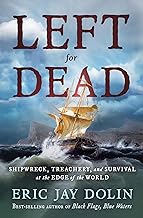Left for Dead: Shipwreck, Treachery, and Survival at the Edge of the World by Eric Jay Dolin; Liveright publisher; (c) 2024; ISBN 9781324-093084; 320 pages, $24.04
By Rabbi Dr. Michael Samuel

 CHULA VISTA, California — I would like to begin with a confession. Since writing for San Diego Jewish World, I have invariably written book reviews about Jewish-related subjects, which are legion. Eric Jay Dolin’s Left for Dead: Shipwreck, Treachery, and Survival at the Edge of the World isn’t on a Jewish subject, but it is a fascinating read. It would undoubtedly make a thrilling and engrossing film. The book has 148 5-star reviews!
CHULA VISTA, California — I would like to begin with a confession. Since writing for San Diego Jewish World, I have invariably written book reviews about Jewish-related subjects, which are legion. Eric Jay Dolin’s Left for Dead: Shipwreck, Treachery, and Survival at the Edge of the World isn’t on a Jewish subject, but it is a fascinating read. It would undoubtedly make a thrilling and engrossing film. The book has 148 5-star reviews!
Eric Jay Dolin is a well-known master storyteller who paints a gripping historical narrative set against the backdrop of the early 19th century. The story not only revolves around an American sealing expedition during the War of 1812 but also delves into the themes of survival, conflict, and moral dilemmas, adding depth and intrigue to the story.
The book begins with an American-flagged brig, led by a seasoned mariner named Charles H. Barnard, setting sail from New York. The expedition aimed to hunt seals in the remote Falkland Islands, intending to profit from China’s lucrative market for seal skins. However, the sealing industry is already facing decline and the onset of the War of 1812 adds further complications, including the threat of British naval forces.
During their voyage, Barnard’s ship encounters a British vessel that has run aground on the treacherous rocks of the Falklands. Despite the ongoing war between their nations, Barnard and his crew, displaying remarkable bravery and selflessness, undertake a rescue mission, saving the British sailors. Among the rescued is a junior Royal Navy officer who soon attempts to commandeer Barnard’s ship, turning it into a prize of war.
Tensions escalate between the American and British sailors. The strained relations, compounded by the harsh and isolating conditions of the Falklands, lead to a dramatic and treacherous decision. The British sailors, led by the Royal Navy officer, betray Barnard and his men. They maroon Barnard and a few of his loyal crew members on the desolate Falkland Islands, abandoning them to what seems like certain death.
Left with limited supplies and facing the harsh environment of the Falklands, Barnard and his men must use their wits and resilience to survive. The narrative details their desperate struggle for sustenance, shelter, and hope. Barnard’s leadership and resourcefulness come to the fore as he organizes the castaways, ensuring they work together to increase their chances of survival.
A poignant and inspiring element of the story is the role of Barnard’s dog, Cent. The loyal dog is a vital companion, providing physical and emotional support to the stranded men. Cent’s valor and tenacity are highlighted throughout the narrative, showcasing the profound bond between man and dog in the face of adversity.
After enduring 18 months of extreme hardship, the castaways are eventually rescued. Their ordeal, however, is far from over. Upon their return, Barnard faces legal battles and has to contend with the betrayal he suffered. The story concludes with reflections on the themes of human endurance, the complexities of moral choices in survival situations, and the unpredictable nature of fate.
Fortunately, the British sailors who betrayed Barnard were not left unscathed by their actions. Legal proceedings were initiated to address the wrongful abandonment of the American sailors. These proceedings highlighted the moral and legal implications of their treachery. Although the specific details of the legal outcomes for each British sailor might not be exhaustively detailed in the book, the overarching theme is that their actions were scrutinized and judged in the aftermath of the rescue.
Whenever a rabbi reads a historical novel replete with moral lessons, inevitably, the rabbi will attempt to draw parallels to various Judaic and biblical themes involving ethics. In Left for Dead, Eric Jay Dolin’s historical account of treachery and survival reminds us of the ethical dilemmas that occur in numerous biblical stories, most notably the story of Cain and Abel. Both stories explore the darker aspects of human nature, highlighting how conflict, betrayal, and moral failings can lead to devastating consequences.
Rabbinical wisdom accentuates many of the themes Dolin’s book discusses: The sanctity of human life is a fundamental principle in Jewish ethics, often prompting complex moral dilemmas with profound implications. The Talmud presents a poignant example in the story of two travelers sharing a limited supply of water in a desolate environment (Torat Kohanim Behar 5:1; BT Bava Metzia 62a). Ben Patura advocates for shared sacrifice, suggesting both should drink and perish together rather than witness the other’s demise. However, Rabbi Akiva counters with a stark interpretation of Leviticus 25:36, emphasizing self-preservation: “Your life takes precedence over his life.”
This debate highlights the tension between communal responsibility and individual survival. While Ben Patura upholds the value of shared suffering and empathy, Rabbi Akiva prioritizes the intrinsic value of each individual life, asserting that self-preservation is not only permissible but morally justified in extreme circumstances.
The Mishnah further explores this theme in a scenario where a community faces the threat of sexual violence from their enemies (Mishnah: Terumah 8:11). The aggressors demand a woman be handed over to them, threatening to defile all women if their demand is not met. The ruling is clear: the community must refuse, accepting the defilement of all rather than sacrificing one individual.
For several reasons rooted in Jewish ethics, Ben Petura’s view must be considered morally superior to Rabbi Akiba’s. He emphasizes the inherent value of shared human experience and empathy, suggesting that both travelers should drink and potentially perish together rather than see the other die. This highlights a profound respect for life and communal bonds.
His stance underscores the moral duty to share burdens equally, aligning with Jewish teachings on the interconnectedness of the community and the need to support one another, even at personal risk. By advocating shared suffering, Ben Petura prioritizes empathy and compassion over self-preservation, valuing the emotional and psychological aspects of human relationships. Although Halakhah ruled, according to R. Akiba, most rabbis in Auschwitz ruled in accordance with Ben Petura.
The Mishnah’s ruling against sacrificing one individual for the benefit of many reinforces the principle of valuing each life equally and rejecting utilitarian compromises. Ben Petura’s view transcends utilitarian calculations, affirming that every life has inherent worth and is not expendable.
In short, I think Ben Petura’s perspective reveals a much higher moral position than R. Akiba’s utilitarian approach. Life is sacred. Ultimately, we are morally answerable to God, who speaks to us through the still-silent voice of the human conscience (1 Kgs 18:20-40; 19:12).
Philo of Alexandria wrote about the power of conscience in the first century: “Conscience, driven by its inherent aversion to falsehood, cannot be silenced. It cherishes virtue and serves as the soul’s internal prosecutor and judge. When violated, conscience accuses, condemns, and opposes the wrongdoing. In its role as judge, it educates, admonishes, and urges the guilty to change their ways. If the individuals involved heed the conscience’s call, they find inner peace and joy. However, ignoring conscience leads to an unrelenting internal conflict, a constant battle that inflicts deep and lasting wounds. This internal turmoil persists until it ultimately destroys the individual’s life, leaving them in a state of misery and despair.”
The men who betrayed Barnard and his crew faced justice, I believe, and could not escape the consequences of their misdeeds and inhumanity. But I suspect that even if the British sailors did not face justice, they would have had to live with the shame and ignominy of hurting people who only wished to help them.
*
Rabbi Dr. Michael Leo Samuel is spiritual leader of Temple Beth Shalom in Chula Vista, California.